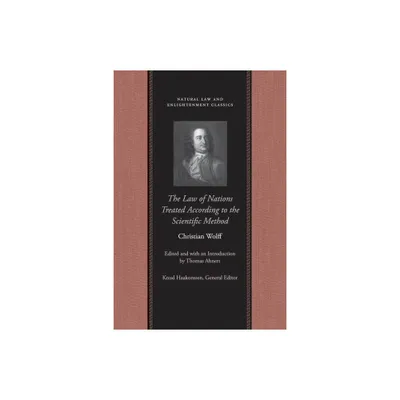Home
the Law of Nations Treated According to Scientific Method
Loading Inventory...
Barnes and Noble
the Law of Nations Treated According to Scientific Method
Current price: $24.00


Barnes and Noble
the Law of Nations Treated According to Scientific Method
Current price: $24.00
Loading Inventory...
Size: Hardcover
*Product Information may vary - to confirm product availability, pricing, and additional information please contact Barnes and Noble
Christian Wolff’s
The Law of Nations
is a cornerstone of eighteenth-century thought. A treatise on the philosophy of human action, on the foundations of political communities, and on international law, it influenced philosophers throughout the eighteenth-century Enlightenment world. According to Knud Haakonssen, general editor of the Natural Law and Enlightenment series, “before Kant’s critical philosophy, Wolff was without comparison the most influential German thinker for several decades as well as a major European figure.”
One of the most striking features of
is Wolff’s single-minded dedication to what he calls the “scientific method.” Though different from what we understand by that today, Wolff’s method still focuses on the illumination of truth via a step-by-step, logical examination of what is already known in order to explain what is unknown. As such,
is Wolff’s triumphant synthesis of his scientific method and his observations regarding the operations of nations. It examines the full gamut of national functions: what duties nations have to themselves and to each other, how national ownership should be viewed, how treaties should be formed, and how nations should act in both war and peace.
Though Wolff’s contemporaries in authority did not always accept his ideas—he was banished from the lands of the king of Prussia for seventeen years for his radical notions regarding moral obligation and human free will—his influence ultimately spread across Europe, shaping philosophical study in many German, Dutch, and Scandinavian universities especially.
The Liberty Fund edition of
is the first in English since the 1934 translation by Joseph H. Drake. Thomas Ahnert has revised and corrected that translation for readability and accuracy and has also added footnotes that explain the many references and technical terms Wolff uses throughout the text.
Thomas Ahnert is Reader and Head of History at the Universityof Edinburgh, Scotland. Among his publications are
The Moral Culture of the Scottish Enlightenment, 1690–1805,
an edition of Thomasius’s
Institutes of Divine Jurisprudence,
and
Religion and the Origins of the German Enlightenment.
The Law of Nations
is a cornerstone of eighteenth-century thought. A treatise on the philosophy of human action, on the foundations of political communities, and on international law, it influenced philosophers throughout the eighteenth-century Enlightenment world. According to Knud Haakonssen, general editor of the Natural Law and Enlightenment series, “before Kant’s critical philosophy, Wolff was without comparison the most influential German thinker for several decades as well as a major European figure.”
One of the most striking features of
is Wolff’s single-minded dedication to what he calls the “scientific method.” Though different from what we understand by that today, Wolff’s method still focuses on the illumination of truth via a step-by-step, logical examination of what is already known in order to explain what is unknown. As such,
is Wolff’s triumphant synthesis of his scientific method and his observations regarding the operations of nations. It examines the full gamut of national functions: what duties nations have to themselves and to each other, how national ownership should be viewed, how treaties should be formed, and how nations should act in both war and peace.
Though Wolff’s contemporaries in authority did not always accept his ideas—he was banished from the lands of the king of Prussia for seventeen years for his radical notions regarding moral obligation and human free will—his influence ultimately spread across Europe, shaping philosophical study in many German, Dutch, and Scandinavian universities especially.
The Liberty Fund edition of
is the first in English since the 1934 translation by Joseph H. Drake. Thomas Ahnert has revised and corrected that translation for readability and accuracy and has also added footnotes that explain the many references and technical terms Wolff uses throughout the text.
Thomas Ahnert is Reader and Head of History at the Universityof Edinburgh, Scotland. Among his publications are
The Moral Culture of the Scottish Enlightenment, 1690–1805,
an edition of Thomasius’s
Institutes of Divine Jurisprudence,
and
Religion and the Origins of the German Enlightenment.


















